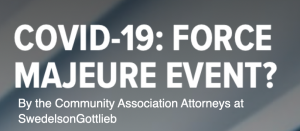 The spread of the coronavirus/COVID-19 has caused and will likely continue to cause unexpected interruption in the business of many California community associations. Many of our association clients are in the middle of large common area refurbishment and restoration projects. With increasing restrictions and/or recommendations by public officials and others intended to control the spread of the coronavirus, contractors/vendors may suspend or cease services/work and advance “force majeure” as a defense to the association’s breach of contract claim. It is important that board members and managers understand what force majeure means and how to respond when a contractor/vendor suspends or seeks to suspend their performance due to the coronavirus citing a force majeure clause contained in the contract between the association and the contractor or vendor. Follow this link to read SwedelsonGottlieb’s article that explains exactly what force majeure means and how it could impact your community association. And if you have Force Majeure issues or questions, contact SwedelsonGottlieb via email (info@sghoalaw.com) or call us: 800/372-2207
The spread of the coronavirus/COVID-19 has caused and will likely continue to cause unexpected interruption in the business of many California community associations. Many of our association clients are in the middle of large common area refurbishment and restoration projects. With increasing restrictions and/or recommendations by public officials and others intended to control the spread of the coronavirus, contractors/vendors may suspend or cease services/work and advance “force majeure” as a defense to the association’s breach of contract claim. It is important that board members and managers understand what force majeure means and how to respond when a contractor/vendor suspends or seeks to suspend their performance due to the coronavirus citing a force majeure clause contained in the contract between the association and the contractor or vendor. Follow this link to read SwedelsonGottlieb’s article that explains exactly what force majeure means and how it could impact your community association. And if you have Force Majeure issues or questions, contact SwedelsonGottlieb via email (info@sghoalaw.com) or call us: 800/372-2207
Articles Posted in Current Affairs
We May Be at Home Waiting Out the COVID-19 Pandemic, But Community Association Boards Still Have Work to Do – By the Community Association Attorneys at SwedelsonGottlieb
 The COVID-19 pandemic has disrupted the community association industry both in terms of operations and morale. Community association members, board members, and community managers are presumably staying home to avoid contracting the coronavirus, and are not meeting in person. This seems to have led to a reluctance, by some association boards, to conduct business. Further, the social distancing requirements imposed by our State and local governments are eliminating social interaction that is critical to the functioning of the community. Along with this, the fear and uncertainty of the COVID-19 pandemic has altered the mood and attitude of board members and professionals involved with operating the community association.
The COVID-19 pandemic has disrupted the community association industry both in terms of operations and morale. Community association members, board members, and community managers are presumably staying home to avoid contracting the coronavirus, and are not meeting in person. This seems to have led to a reluctance, by some association boards, to conduct business. Further, the social distancing requirements imposed by our State and local governments are eliminating social interaction that is critical to the functioning of the community. Along with this, the fear and uncertainty of the COVID-19 pandemic has altered the mood and attitude of board members and professionals involved with operating the community association.
The disruption has become apparent and severe. However, we must examine the “silver linings” and “play with the cards we have been dealt” – so to speak – in order to preserve the integrity of our communities and functioning of same. The business that needed to be done before we all retreated to our homes to be safe still needs to get done and the longer boards wait to do that business, the more likely it is that there will be complications. Below are a few ideas that board members should consider moving forward in the face of this pandemic that may last for months.
1. Meetings. While in-person meetings should be avoided, associations may still be able to conduct meetings via conference call and/or videoconference (e.g., Zoom). The Davis-Stirling Act sets out a procedure for telephone conference meetings, but the Code requires that someone be at a physical location where the owners can listen to the call via speakerphone and participate during open forum. We believe that the ongoing pandemic would warrant a substantial compliance approach. That is, associations can conduct the meeting via telephone or video conference and attempt to comply with the applicable statutes, as much as possible, while at the same time complying with the State and City social distancing orders now in effect. This way, associations may still conduct business and hold meetings so that the common area components continue to be maintained, insurance policies do not lapse, and other obligations like enforcement of the Governing Documents are met. In other words, California community associations can still function while the board members and management are at the same time complying with government mandated social distancing requirements.
COVID-19 and Community Association Duties and Responsibilities – A Guidebook for California Community Associations Updated as of March 27, 2020 – By the Community Association Attorneys at SwedelsonGottlieb
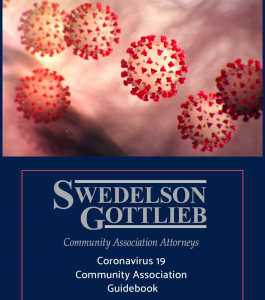 SwedelsonGottlieb updated its COVID-19 Community Association Guidebook on March 27, 2020. We put this Guidebook together to address our new reality and how California community associations should be dealing with the pandemic. We are all staying at home unless our jobs are essential and we are socially distancing ourselves from one another. The reality is that community associations cannot close down. Associations must continue to operate as they control the common areas where people live, and so much more. And the COVID-19 pandemic has created issues that we have never had to deal with in the past.
SwedelsonGottlieb updated its COVID-19 Community Association Guidebook on March 27, 2020. We put this Guidebook together to address our new reality and how California community associations should be dealing with the pandemic. We are all staying at home unless our jobs are essential and we are socially distancing ourselves from one another. The reality is that community associations cannot close down. Associations must continue to operate as they control the common areas where people live, and so much more. And the COVID-19 pandemic has created issues that we have never had to deal with in the past.
SwedelsonGottlieb is open for business; most of us are working remotely. And, we continue to receive inquiries from board members and managers concerning what community associations should be doing to address the COVID-19 pandemic and the impact on their communities. As we explain in the Guidebook, we do not believe that community associations have any direct or legal responsibility to deal with the coronavirus itself as it is each resident’s responsibility to protect themselves from contracting COVID-19. That said, some commonsense things should be kept in mind and we address those things in the Guidebook.
To be clear, this does not mean that associations should not be implementing policies to address the coronavirus, such as taking steps to clean and sanitize to the extent possible the common area, close common area amenities such as pools, gyms and recreation centers or clubhouses. But there is only so much that associations can do. As we explain in the Guidebook, there are things that each California community association can and should be doing, especially when an association learns that a resident has contracted or been exposed to the COVID-19 virus, to limit liability exposure.
Coronavirus and Community Association Duties and Responsibilities; A Guidebook from the Community Association Attorneys at SwedelsonGottlieb
 It is not a hoax; it is a pandemic. And as a result, we are receiving inquiries from board members and managers concerning what community associations should be doing to address the coronavirus (COVID-19) pandemic and the impact of same on their communities. To address these questions, SwedelsonGottlieb published a guidebook that explains, among other things, why we do not believe that community associations have any direct responsibility to deal with the coronavirus; rather it is each residents responsibility to take steps to limit their exposure to the virus to avoid contracting the virus. That said, there are some commonsense things that should be kept in mind. And there are employees and staff to consider. Follow this link& to read and download SwedelsonGottlieb’s Guidebook. And note that as the information that we are all receiving about the coronavirus and how governmental agencies are dealing with the disease keeps evolving, so will our advice. So be sure to visit HOAlawblog for the latest coronavirus information and advice as it relates to California community associations.
It is not a hoax; it is a pandemic. And as a result, we are receiving inquiries from board members and managers concerning what community associations should be doing to address the coronavirus (COVID-19) pandemic and the impact of same on their communities. To address these questions, SwedelsonGottlieb published a guidebook that explains, among other things, why we do not believe that community associations have any direct responsibility to deal with the coronavirus; rather it is each residents responsibility to take steps to limit their exposure to the virus to avoid contracting the virus. That said, there are some commonsense things that should be kept in mind. And there are employees and staff to consider. Follow this link& to read and download SwedelsonGottlieb’s Guidebook. And note that as the information that we are all receiving about the coronavirus and how governmental agencies are dealing with the disease keeps evolving, so will our advice. So be sure to visit HOAlawblog for the latest coronavirus information and advice as it relates to California community associations.
Proposed Senate Bill (SB) 323 (Wieckowski) Eliminates Qualifications For Serving On The Board and Changes The Law On California Community Association Elections; It Is Not the Right Solution
Prepared by the Community Association Attorneys at SwedelsonGottlieb
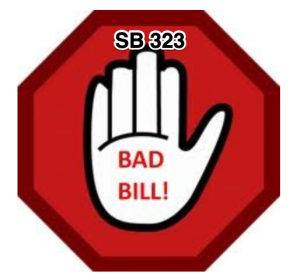
Senate Bill 323, proposed new law that would impact how California community association conduct elections, was approved by the Senate and Assembly was presented to Governor Newsom for his signature. This proposed legislation will impact and change the procedural requirements for most California community associations’ elections. Unfortunately, this proposed legislation goes too far and it is not the right solution to whatever it is that motivated Senator Wieckowski to author this new legislation.
For example, under current law, Civil Code Section 5200(a)(9), members of a community association can request their association’s list of members, including the members names and addresses. Currently Civil Code section 5220 allows members the ability to opt out and keep their contact information, which they deem private, off the list. SB 323 includes a loophole that effectively eliminates the ability for owners to opt out of having their name and personal contact information provided to another member. This proposed new law requires owners to provide their name and address on the envelope that includes the ballot, which SB 323 would make part of the list of records available for member inspection.
AB 2912 Fraud and Embezzlement//Fidelity Bonds & Financial Review
From the Community Association Attorneys at SwedelsonGottlieb 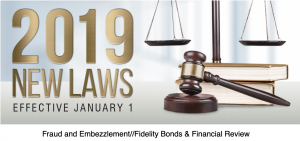
It is no secret that community associations are often targets for embezzlement. But they are not alone. Newspaper articles tell us that it happens to various types of businesses and organizations, even attorneys and lawyer/bar organizations. Fraud and embezzlement seems more likely to occur when no one is watching those that control the checkbooks. And unfortunately, many many condominium, stock cooperative and planned development boards of directors become too trusting and they don’t keep an eye on what their manager or treasurer are doing.
To ensure that community associations are better protected, the California legislature passed AB 2912, acknowledging that associations are susceptible to fraud and embezzlement, and that more is needed to completely achieve the goal of protecting community association funds. Pay close attention as there are new requirements for both managers and boards amending two sections of Civil Code and adding three new ones. AB 2912 made the following changes to the law:
California Legislature Fixes the Law on Member Notice & Notice of Rule Changes-Amends Civil Code §4040 and Civil Code §4360
By the Community Association Attorneys at SwedelsonGottlieb 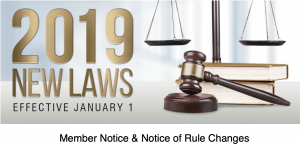
Through SB 261, the California Legislature fixed some issues with prior legislation dealing with delivery of notices and related matters and generally fixed some issues that had come up after prior legislation was adopted. This bill became effective in January 1st and amends the following existing sections of the Civil Code as stated:
• Email Consent to Document Delivery — Civil Code §4040 (Individual Notice), which allows for individual delivery of notices and other documents by email if an owner consents to this in writing was amended to allow an individual owner to permit/revoke consent to allow individual notice by email. While most attorneys thought that an email was considered a writing, this amendment eliminates any confusion.
SB1265 – A Dumb Idea for a Bad Law
 A senate bill seeking to prohibit California community associations from establishing qualifications for candidates to run for their boards of directors among other changes and requirements (including possible invasion of owner privacy) is a dumb idea that would create bad law.
A senate bill seeking to prohibit California community associations from establishing qualifications for candidates to run for their boards of directors among other changes and requirements (including possible invasion of owner privacy) is a dumb idea that would create bad law.
On April 5th, Los Angeles Times’ Sacramento columnist George Skelton noted that the California legislature passed nearly 1,000 bills in 2017: “A few were important. Most were not. Many were frivolous, some dumb – a waste of politicians’ time and public money. . . There are many bills pending in the legislature again this year that the state could do just fine without.”
One bill I think the State could do just fine without is SB1265. And if you live in a California community association, I think you’ll agree. You should IMMEDIATELY let the legislature know that this legislation is unnecessary, and that the State could do just fine without SB1265. Let me explain how I and many others in the industry came to this conclusion.
Minimum Wage Increase Will Have An Impact On California Community Associations
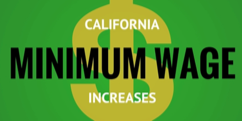
From the Community Association Attorneys at SwedelsonGottlieb
The minimum wage is going up. As a result of a change in the law to take effect on January 1, 2017, the statewide minimum wage will gradually increase over the next six years until it hits $15 per hour. Further, Los Angeles and San Francisco already have their own laws in place to hit this mark even sooner and may see higher increases depending on the rate of inflation as measured by the Consumer Price Index (CPI).
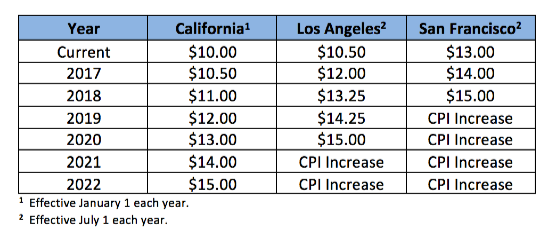
The wage increase will affect an associations existing employees and will likely impact any association’s existing and potential vendor contracts. Roughly one-third of all California employees are paid minimum wage, and many vendors serving associations rely heavily on minimum wage employees. In the past, California has increased the minimum wage by 1-3% annually, but the pending increase represents a 50% rise over six years, which represents a considerable cost for any vendor to absorb. As a result, vendors will undoubtedly pass along their higher labor costs to the associations they serve.
New Law Requires That California Community Associations/HOAs Request That Members Provide Their Contact Information — New Civil Code § 4041
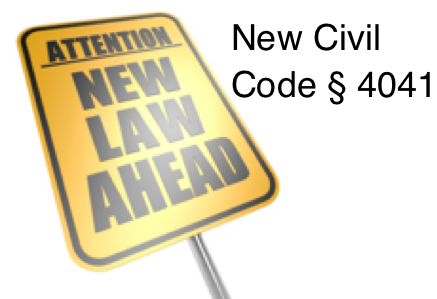 By the Community Association Attorneys at SwedelsonGottlieb.
By the Community Association Attorneys at SwedelsonGottlieb.
Starting January 1, 2017, every California community association will be required to ask its members to provide their contact information and property status. New Civil Code § 4041 will require, starting January 1, 2017, that each association must solicit the following information from its members:
1. The mailing address where notices from the association are to be delivered;
 HOA Law Blog
HOA Law Blog


